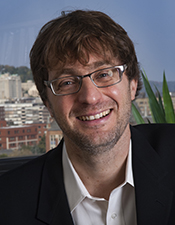November 13, 2012
 Thanassis Rikakis has a penchant for building interdisciplinary teams encompassing the disciplines of art and technology to create innovations with impact. This past summer, he brought his skills to Carnegie Mellon, the place where no one does it better.
Thanassis Rikakis has a penchant for building interdisciplinary teams encompassing the disciplines of art and technology to create innovations with impact. This past summer, he brought his skills to Carnegie Mellon, the place where no one does it better.
In August, Rikakis joined Carnegie Mellon as its new vice provost for design, arts and technology. He is a full professor in the College of Fine Arts' School of Design and holds courtesy appointments in the School of Music and the College of Engineering's Biomedical Engineering Department. He also oversees the university's Entertainment Technology Center (ETC).
Since his arrival from Arizona State University, Rikakis has been meeting with people inside and outside of the university, gathering information that will help him to gain a better understanding of the synergies that have established Carnegie Mellon as the world-leading university in arts and technology.
He says he is looking forward to working with the many individuals who have helped to build that reputation.
The Piper recently caught up with Rikakis to talk about his new role, the university and the path that led him to Pittsburgh.
Q&A: New Vice Provost Looks To Connect the Dots
By Pam Wigley
 Thanassis Rikakis has a penchant for building interdisciplinary teams encompassing the disciplines of art and technology to create innovations with impact. This past summer, he brought his skills to Carnegie Mellon, the place where no one does it better.
Thanassis Rikakis has a penchant for building interdisciplinary teams encompassing the disciplines of art and technology to create innovations with impact. This past summer, he brought his skills to Carnegie Mellon, the place where no one does it better.In August, Rikakis joined Carnegie Mellon as its new vice provost for design, arts and technology. He is a full professor in the College of Fine Arts' School of Design and holds courtesy appointments in the School of Music and the College of Engineering's Biomedical Engineering Department. He also oversees the university's Entertainment Technology Center (ETC).
Since his arrival from Arizona State University, Rikakis has been meeting with people inside and outside of the university, gathering information that will help him to gain a better understanding of the synergies that have established Carnegie Mellon as the world-leading university in arts and technology.
He says he is looking forward to working with the many individuals who have helped to build that reputation.
The Piper recently caught up with Rikakis to talk about his new role, the university and the path that led him to Pittsburgh.
